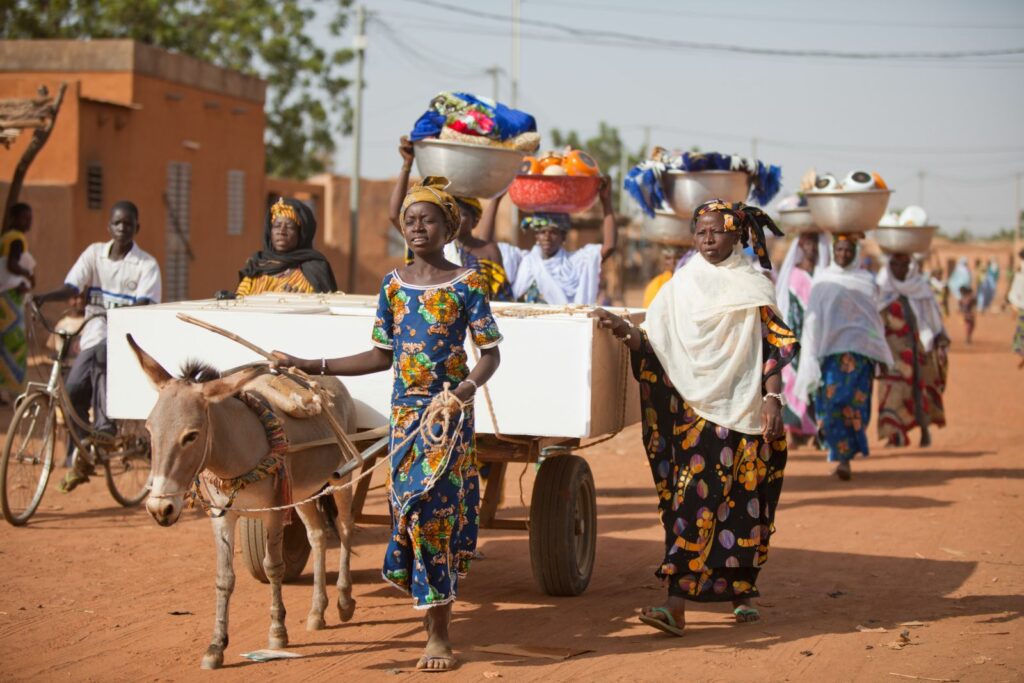The Sahel: Support for violent extremist groups offers women status privileges
A new report by International Alert shows that women in the central Sahel region of Africa may support violent extremist groups because aspects of Sharia law and jihadist governance resonate with their own aspirations.
Tackling violent extremism in the region therefore requires providing women (and men) with real alternatives to jihadism, addressing their needs for livelihoods, security, and status.

The report, titled Dogmatism, or pragmatism? Violent extremism and gender in the central Sahel, draws on interviews with 339 respondents from villages in the Liptako Gourma cross-border region in Burkina Faso, Mali and Niger, largely inhabited by the Fulani people. It looks at how the presence of jihadist groups has become accepted in the region despite the accompanying examples of brutality and oppression.
The report shows that deeply rooted patriarchal values held in Fulani culture play an instrumental role in the level of support for jihadists.
For some women, especially those marginalised because of their status (such as the low-caste), being connected with an extremist group, or even marrying a jihadist, could offer a chance of unprecedented social recognition.
For example, in traditional Fulani culture, staying at home to look after the children, or wearing the veil is considered signs of nobility. Doing so under Sharia law could help women live a more peaceful and prosperous life, rather than working in the fields in harsh conditions.
Without necessarily sharing the ideology of religious extremism, women may therefore look favourably on certain measures introduced by ‘jihadist governance’. As testimonies from Sahelian women and men suggest:
“[With Sharia law in force] women won’t have to work until they’re exhausted. They will stay at home and have cherished children.”
“It’ll be better for the women when Sharia is introduced. They’ll be treated like queens by their husbands.”
The contribution of women to the jihadist cause should not be underestimated, from laundry, cooking and nursing, to collecting information and money. They also incite men to take up arms through songs, accolades and preaching that celebrate martial values, stigmatise weakness and encourage men to demonstrate their bravery.
The incentive for men to join extremist groups also stems from traditional norms, dictating that a ‘real man’ should display bravery and provide for his family. In a context of prolonged conflict, poverty and displacement, some men may find it less stigmatising to be a jihadist than to be unemployed, and therefore unable to fulfil their protection role. As one respondent said:
“Anyone who refuses to fight to protect the community shouldn’t be seen as a man: he is a coward.”
Although violent extremism is frequently associated with misogyny and gender discrimination, research shows these factors are not a prerogative of jihadism, but are deeply ingrained in the daily lives of women in the patriarchal societies of central Sahel.
This capacity for violent extremism to resonate, if somewhat ambivalently, with the imagination and aspirations of certain fringes of rural communities, including women and young people, helps to explain how jihadist groups have been able to become established in the region.
The level of support for extremist groups varied across the Sahel region, but was strongest where jihadist groups held the most control (especially in Mali and Niger).
The report concluded with a set of recommendations for international and national strategies to combat violent extremism in the Sahel to include an understanding of traditional gender norms and tackling the root causes of the conflict.
Ahmed Maiga, Mali Country Director at International Alert, said:
“In the central Sahel region, the presence of jihadist groups offers local people opportunities they could not have previously hoped for. If we are serious about tackling violent extremism and building sustainable peace, then sending in troops is not enough. We must offer women and men real alternatives to promises made by jihadists, from jobs to security and better governance systems.”
Background
The central Sahel is experiencing an escalation in violence that illustrates the problem faced by states in the region as they endeavour to hold back the advance of jihadist groups.
Despite increased resources being invested in scaling up securitised responses across the Sahel, violent conflict continues unabated. The persistence and spread of the violence, even against some of the most sophisticated and well-resourced international military forces, illustrates the need for responses that address the social, economic and political grievances that are being manifested as violent extremism.
Several studies have provided important perspectives on the control and influence violent extremist groups have gained in the border zones of Mali, Burkina Faso and Niger.
However, one factor that has often been mentioned but rarely analysed in depth is the link between gender and violent extremism in the Sahel.
Gender plays an important role in the efforts that violent extremist groups appear to be making to control women and ensure they conform to the behavioural norms of jihadist ideology. They are also effective in playing on traditional norms of men as warriors as a call to action against state systems that have failed to defend the interests of their families and communities.
Media contact: [email protected]





